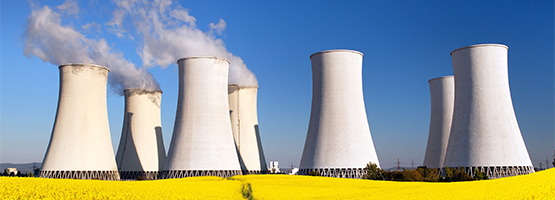The use of nuclear energy for civilian purposes began in the mid-1950s. U.S. President Dwight D. Eisenhower outlined his vision of the peaceful use of nuclear energy in his “Atoms for Peace” speech to the United Nations in 1953. And the International Atomic Energy Agency (IAEA) was founded in 1957. Switzerland was one of the organisation’s founding member states.
The development of nuclear energy for civilian purposes began in Switzerland and the rest of Western Europe in the 1970s and was completed at the beginning of the 1980s. At the same time, the anti-nuclear movement grew considerably, in particular following the accidents on Three Mile Island in 1979 and Chernobyl in 1986.
The accident at the Japanese nuclear power plant in Fukushima Daiichi in March 2011, which was caused by an earthquake and tsunami, fuelled the debate in numerous countries concerning the use of nuclear energy. In light of this accident in Japan, both Switzerland and Germany decided to phase out the use of nuclear energy. Spain and Belgium are planning to phase out their nuclear energy programmes by 2030. Switzerland remains committed to maintaining high safety standards at the national and international levels and aims to maintain its competence in nuclear technology in order to ensure the validity of the positions it adopts in this debate.
Currently, the countries most invested in nuclear energy are France, Slovakia and Hungary. France meets 70 percent of its electricity needs through nuclear energy, and Slovakia and Hungary generate almost half of their national demand for electricity with this technology.
Worldwide, approximately 440 nuclear power plants are in operation in 32 countries. While this number is not growing, the capacities of existing facilities are increasing and, by the end of 2019, amounted to 390 GW. The share of electricity generated using nuclear energy currently stands at 10 percent.
More than half of the nuclear reactors in operation worldwide are now more than 30 years old and will be decommissioned in the coming years. The IAEA forecasts that the production of electricity generated from nuclear energy will continue to increase until 2050. At the moment, 53 new nuclear power plants are under construction in a number of countries. A further 118 are in the planning stage. A large proportion of these are in China, India and Russia.
The Swiss Federal Office of Energy represents Switzerland in the international organisations active in this field:
- It sits on the governing bodies of the International Energy Agency (IEA), the Nuclear Energy Agency (NEA) of the OECD, the IAEA and its expert commissions, and it takes part in international conferences;
- It participates in multilateral negotiations in the areas of energy policy, in particular the peaceful use of nuclear energy (IAEA, NEA), the non-proliferation of nuclear weapons, the development of a multilateral strategy for the verification of possible disarmament activities of nuclear-weapon states, and controls on nuclear exports;
- It is active in bilateral negotiations and in bilateral committees, e.g. in the Franco-Swiss committee for the safety of nuclear installations, the German-Swiss committee for the safety of nuclear installations and the Italian-Swiss committee of the Italian monitoring authority for nuclear safety and protection against radiation.






